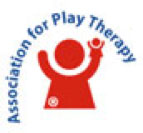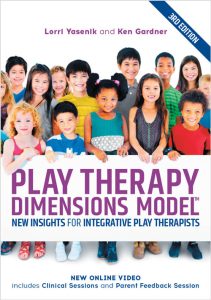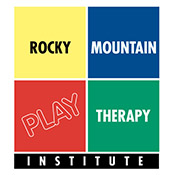Green Stream: Foundations of Play Therapy
Play Therapist: Registration/Certification Route
The Green Stream-Foundations of Play Therapy consists of 9 days of training (67.5 contact hours of play therapy training) offered in a blended format (on-line live or in-room) plus a pre-course on-line component (with a Mastery Test) and a post-course case conceptualization assignment (totalling 12.5 non-contact hours). Students will have three months to complete the written assignment.
The Green Stream Foundations of Play Therapy Program is a fully integrated training program, versus a series of workshops or courses. It is intended for Master's level graduate/mental health practitioners who wish to build on their current professional designations. A Master’s degree in a mental health field (or enrolment in a mental health Master's degree program) is required for admission to the Foundations of Play Therapy Program. This is the first level of play therapy training (80 hours). After successful completion of the Foundations of Play Therapy Program (Green Stream program) students will be eligible to enrol in the second level (Red Stream Advanced Theories and Techniques of Play Therapy – 80 hours).
In North America there are two routes to choose from. The APT route is shorter in terms of training, supervision, and practice hours, and gains access to a large internationally recognized professional organization.
 APT Route: To become a Registered Play Therapist (RPT) with the Association for Play Therapy (APT), one of the requirements is to complete 150 hours of approved training in play therapy. The Green Stream, combined with the Red Stream, provides 150 play therapy training hours.
APT Route: To become a Registered Play Therapist (RPT) with the Association for Play Therapy (APT), one of the requirements is to complete 150 hours of approved training in play therapy. The Green Stream, combined with the Red Stream, provides 150 play therapy training hours.
APT credentialing standards require participants to complete play therapy training, sequentially, in three phases. In addition, instructional hours, clinical experience and supervision hours must be accrued during these three phases, in a time period of no less than two years (and no more than 7 years).
As sequential and integrated programs, the Green and Red Streams programs are conceptualized in three phases; Green Stream – phase 1 (first 5 days); Green Stream – beginning phase 2 (remaining 4 days); Red Stream – ending phase 2 (first 3 days); Red Stream – phase 3 (remaining 6 days).
APT reserves the right to review any/all training hours submitted for registration as a play therapist.
 CAPT Route: To become a Certified Play Therapist (CPT) with the Canadian Association of Play Therapy (CAPT), Canadian standards require 180 hours of play therapy training from a CAPT Approved Provider, or from an institute of higher learning. Participants who intend to become Certified Play Therapists should take the Green Stream, Red Stream +plus, and one of the core (3-Day) Yellow Stream Certificate programs. It is recommended that participants take the Yellow Stream Certificate in Sandplay with Special Populations to fulfill the 180 hour requirement. CAPT reserves the right to review any/all training hours submitted for registration as a play therapist.
CAPT Route: To become a Certified Play Therapist (CPT) with the Canadian Association of Play Therapy (CAPT), Canadian standards require 180 hours of play therapy training from a CAPT Approved Provider, or from an institute of higher learning. Participants who intend to become Certified Play Therapists should take the Green Stream, Red Stream +plus, and one of the core (3-Day) Yellow Stream Certificate programs. It is recommended that participants take the Yellow Stream Certificate in Sandplay with Special Populations to fulfill the 180 hour requirement. CAPT reserves the right to review any/all training hours submitted for registration as a play therapist.
Note: RMPTI is not a registering body for play therapists. Rather, RMPTI provides approved training. For details regarding registration with the two main bodies, see the links below. APT and CAPT alone hold the right to accept or deny any continuing education training at their discretion.
Uniquely designed

Based on the third edition of the Play Therapy Dimensions Model, which is an integrative decision-making model for play therapists, participants learn not only a range of play therapy theories, approaches, and techniques, but also how to conceptualize the play therapy process from an integrative perspective. This framework assists practitioners to identify when they are working non-directively to directively and from unconsciously to consciously in play therapy. The 3rd Edition of the Play Therapy Dimensions Model book has added some important concepts such as how to conceptualize pre-imaginative play and the importance of scaffolding pre-imaginative play skills. Emphasis is placed on developing skills in tracking client progress and therapist use of self. Participant learning is enhanced through role-plays and experiential activities. The program is taught in a blended format both on-line and in-room.
Yasenik. L., and Gardner, K (2023). Play therapy dimensions model: New insights for integrative play therapists. Jessica Kingsley Publishers..
Program Goals
The primary goal of this program is to develop practical skills and theoretical knowledge base necessary to use play-based interventions from an integrative perspective. Additionally, participants learn about:
- The history of play therapy
- The role of the play therapist
- Core play therapy theories/approaches (e.g., Adlerian, Child-Centered & Gestalt Play Therapy)
- Play therapy techniques
- Play therapy modalities (e.g., sandplay, art making; music & movement)
- The play therapy process
- Ethics
- Play-based observation and treatment planning strategies
To access program dates see the training calendar.
For full details please refer to the application form.
Who Should Attend?
The Green Stream, Foundations of Play Therapy program will be of interest to those individuals who are currently working with children and who have a Master's degree in a mental health field (or who are enrolled in a Master's degree in a mental health field). Those enrolled in graduate programs in the mental health field (psychology, social work, counselling and psychotherapy) may use this program to build on their current professional designations.
Entrance Requirements: Attending or completed a Master's degree in a mental health field. Participants who intend to be certified with CAPT must have a student membership prior to commencing course work (this is a requirement by CAPT; membership fees are to be paid directly to CAPT). Participants in either route (APT or CAPT) should independently arrange for supervision at the outset of training. APT credit will not be awarded to a non-mental health professional.
Reqired Readings:
Yasenik. L., and Gardner, K. (2023) (3rd edn). Play Therapy Dimensions Model: New Insights for Integrative Play Therapists. London: Jessica Kingsley Publishers.
Landreth, G. (2023) (4th edn). Play therapy: The art of the relationship New York: Routledge.
How can I apply these skills?
Participants will be able to follow a basic case conceptualization process and identify ways to work with children with mild to moderate adjustment difficulties. They may use specific play techniques in their own settings and identify children who are in need of play therapy and make appropriate referrals to a Certified Play Therapist.
PROGRAM OUTLINE
Pre-course:
On-Line Component (7 non-contact hours): An Introduction to Play Therapy
Two weeks prior to the course date, registered participants will be provided with a passcode for the RMPTI training website (www.rmpti.org), where they take a 3-hour on-line program. The on-line program provides an introduction to the following topics and activities:
- Introduction to program
- Defining Play Therapy and the play therapy continuum
- Therapeutic powers of play
- Play modalities
- History of play therapy
- Self-assessment and experiential exercises
Participants should simultaneously begin reading the two assigned textbooks Play Therapy Dimensions Model: New Insights for Integrative Play Therapists (Yasenik & Gardner, 3rd edition, 2024) and Play Therapy: The art of the relationship (Gary Landreth, 3rd edition, 2012).
At the end of the on-line section participants are to complete a mastery test (true/false) to demonstrate understanding or core concepts covered on-line and in the textbooks. The Mastery Test is to be handed in on or before the first day of class.
Day 1: Understanding the play therapy process & essential play therapy skills
Day 2: Exploring Models of Play Therapy
Day 3: Symbols & Metaphors:
Day 4: Understanding the Directiveness Dimension
Day 5: Play Therapy Process - Part 1
Day 6: Play Therapy Conceptualization Tools
Day 7: Children & Trauma
Day 8: Play Therapy Process - Part II
Day 9: Play-Based Assessments, Ethics and Professional Guidelines for Play Therapists
Learning Objectives
To provide participants with an introduction to play therapy history, theory, techniques, and skills in play therapy. Upon successful completion of the course each participant will be able to:
- List the therapeutic powers of play and the principles of underlying play therapy
- Describe at least six different models of play therapy
- Explain integrative approaches and decision making: awareness of the continuum of directive non-directiveness in play therapy
- Discuss the importance of child development and play development in play therapy
- Describe the play therapy process and the role of the play therapist
- Design a play-based assessment to guide treatment planning
- Explain the importance of ethical issues of play therapists
- Analyze of use of self in play therapy
- Explain traumatic versus non-traumatic play
- Describe the importance of relationship development in the therapy process
Instructional Methods
- Experiential activities
- Video presentations
- Case examples
- Power point slide presentation
- Experiential learning through role plays
- Session seminars
- Reading assignments
- Written homework exercises
- Small group learning activities
Certificate Award
Participants will receive a Certificate in Foundations of Play Therapy from RMPTI, indicating completion of both the academic and experiential learning components of the Green Stream. The certificate confirms the completion of 80 hours of specialized play therapy training following the guidelines set by APT, CAPT and BCPTA.
APT, CAPT, & BCPTA Continuing Education Credits will only be awarded to Mental Health Professionals. All credits must be approved by the appropriate governing body and cannot be guaranteed by RMPTI. This training meets the definition of APT’s Live-Webinar.
The Certificate is awarded on the basis of:
- Satisfactory completion of a written assignment
- Satisfactory attendance (no whole module may be missed unless there are extenuating circumstances. A makeup assignment may be requested depending on time missed)
